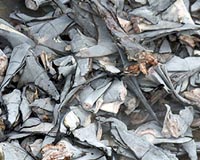| . |  |
. |
Canberra, Australia (SPX) Dec 21, 2010 Tasmanian scientists will soon have unprecedented access to data from high-tech equipment for monitoring coastal and ocean ecosystems. The technology is being provided through the new Tasmanian science node of the Australian Integrated Marine observing System (IMoS) which is being launched at CSIRo in Hobart. "The ocean waters and habitats surrounding Tasmania are important to the state's economic wellbeing, yet are poorly understood," IMoS Director, Tim Moltmann, said. "This complex environment has strong seasonal variation and many offshore islands, submarine canyons and seamounts that support unique biodiversity and productivity hot-spots. "It is also a region where there has been rapid change in both oceanography and biodiversity, offering a great opportunity to characterise and understand how Australian marine ecosystems may respond to climate change. "TasIMoS has planned the observing system in Tasmania's oceans so that these challenges can be addressed in joint research by CSIRo and the Institute of Marine and Antarctic Studies at the University of Tasmania." The TasIMoS observing system will: + provide real time data from the Maria Island National Reference Station; + monitor water properties and seabed habitats using several types of autonomous vehicles; + detect a range of tagged marine animals using curtains of acoustic receivers; and + validate satellite remote sensing of ocean conditions. The datasets will help scientists underpin a whole-of-system approach to managing aquaculture and fisheries resources and biodiversity, including marine reserve management Leader of TasIMoS, Dr Peter Thompson of CSIRo, said the datasets will support the development of regional and local models of oceanography, nutrient cycling and ecosystems. "IMoS data will allow Tasmanians to better manage their marine resources," Dr Thompson said. "Scientific assessments of the current state of valuable marine resources, and of likely future states of those resources, will be dramatically improved. "For example, repeat surveys at sites along the Tasmanian coast will track the progress of the spiny sea urchin, a serious threat to Tasmania's rock lobster industry." Dr Thompson said IMoS data already show the Tasman Sea is warming much faster than other places in the world. "The new IMoS observational capabilities will make it possible to understand why this is so and its likely future impacts on the marine ecology of Tasmania. "We are investing now, but the value of these sustained observations grows every year and they will be even more valuable to future generations." IMoS is supported by the Australian Government, through the National Collaborative Infrastructure Strategy and the Super Science Initiative. It is led by the University of Tasmania on behalf of the Australian marine and climate science community. The TasIMoS Node is co-led by CSIRo and the University of Tasmania through the Institute of Marine and Antarctic Studies (IMAS). Data collected by IMoS are made available to the public via the IMoS ocean Portal.
Share This Article With Planet Earth
Related Links CSIRo Marine and Atmospheric Research Integrated Marine observing System (IMoS) Water News - Science, Technology and Politics
 US gets tough on shark fins
US gets tough on shark finsWashington (AFP) Dec 20, 2010 The US Senate on Monday toughened laws against shark finning, hoping to save the ancient fish which experts fear is on the brink of extinction due to growing demand in Chinese restaurants. The removal of sharks' fins - a delicacy in Chinese cuisine - was already illegal in the United States. The new rules close a key loophole that permitted trade in the Pacific so long as sharks were not f ... read more |
|
| The content herein, unless otherwise known to be public domain, are Copyright 1995-2010 - SpaceDaily. AFP and UPI Wire Stories are copyright Agence France-Presse and United Press International. ESA Portal Reports are copyright European Space Agency. All NASA sourced material is public domain. Additional copyrights may apply in whole or part to other bona fide parties. Advertising does not imply endorsement,agreement or approval of any opinions, statements or information provided by SpaceDaily on any Web page published or hosted by SpaceDaily. Privacy Statement |